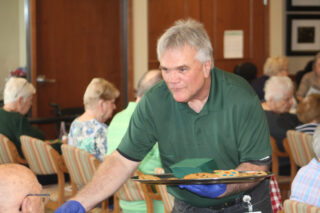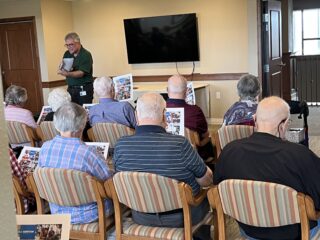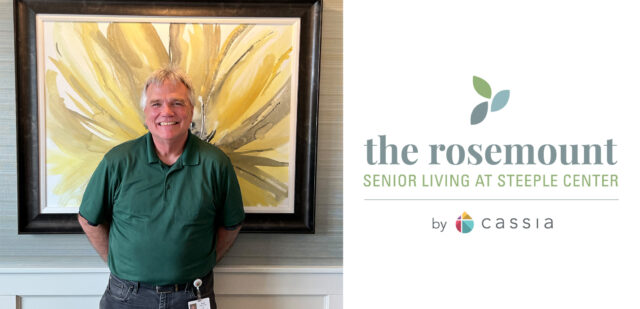It’s 9:25 a.m. on a Thursday and Mabel makes her way into the community room at The Rosemount Senior Living at Steeple Center in Minnesota. Topic Talk doesn’t begin until 10 a.m., but Mabel wants a good seat for the weekly presentation, as do other residents.
More than 30 residents fill the room, a light crowd compared to the 40-plus who attend many weeks.
Carol, The Rosemount’s receptionist, stops by to complete “I’m OK” checks.

“I don’t call their apartments because I know they’re here,” she says.
Before the Topic Talk, Scott the presenter hands out treats—they must be M&M cookies or Scott says he’ll hear about it. Just like when Karen, the activities director, tried to rearrange the timeframe for Topic Talk.
“That was not a good idea,” she says. “This is a sacred hour.”
Once it begins, the only time the residents do not have their eyes glued to Scott is when they look at the detailed handout he provides.
“He can talk for an hour and you still wait for his next sentence,” Mabel says.
“He’s very dynamic; he really keeps people engaged,” Karen adds. “It’s the most attended activity we have.”
A Little History
Scott taught high school history in the Rosemount-Apple Valley-Eagan School District for 30 years. He retired in 2015, when he was first eligible.
“I knew I wanted to do something totally different from teaching,” Scott says. “I wanted to serve people. I wanted to do something you could wake up in the morning, look forward to and go to bed saying, ‘I did something good.’”
As his parents were in hospice, those caring for them inspired him.
“I asked the staff, ‘How do you do this? How can you come here every day knowing the people you take care of will pass away?’ They said, ‘It’s an honor to be a companion on this leg of their journey,’” Scott says. “That touched me very much. I said that was a second career I could do.”
Scott applied to work at The Rosemount as it was opening in early 2016. He learned the community had openings in the culinary and housekeeping departments.
“I said, ‘I can do culinary. I can work in the dining room and kitchen,’” Scott says. “Bill Peters, the director at the time, said, ‘We’re going to leverage all the other things you can bring to the table. Whatever you can do to enhance the lives of the residents, bring it to me. We’ll get you involved in as many activities as we can.”
Scott has gotten involved in many ways and splits his time between the culinary and activities departments.
As a culinary employee, Scott washes dishes and serves meals. Some people question his career choice.
“They say, ‘You wash dishes?’ Yeah, but for the time I get to be in the dining room, I get to interact with people,” Scott says. “And, when I do activities, it’s fun.”
Early on, Scott heard residents discussing current events at breakfast, lunch and dinner every day.
“I went to Bill and asked, ‘Would you like me to do a talk every week?’ He loved the idea,” Scott says.
Within a few months, Scott began presenting Topic Talk. Now, residents from all levels of care—independent living, assisted living, care suites and memory care—attend Topic Talk.
So Much to Talk About
Current events typically drive the discussion, but Scott mixes in history, as well. He sometimes follows the weekly theme of the community’s meals and happy hours, such as Greece or Las Vegas. No matter the topic, Scott tries to make it relatable to his audience.
“I try to go back to what they remember,” Scott says. “Usually, I tell them at the start, ‘You lived through when this whole thing started.’”
When presenting about the Middle East, Scott asked if anyone had visited the Holy Land. Residents also shared what they knew about Iran: the Shah, the Ayatollah and the Iranian Hostage Crisis.
The next week, Scott led a discussion about OJ Simpson, who had recently passed away. Residents shared what they remembered about his football and acting careers, his murder trial and “Not Guilty” verdict. Scott shared about Simpson’s later years, as well.

Scott is not afraid to talk politics, but he is careful about how he does it.
“I don’t shy away from political questions,” Scott says. “We’ll talk about Trump’s hush money trial. I’ll ask them what they think. I’ll give them legal and historical information. Many people tell me they can’t tell if I’m a Republican or Democrat or what side I take.”
He tries not to share his opinion but always invites others to share theirs.
“Some will say, ‘I think this,’ and I love it. I love every second of it,” Scott says. “I liked it when my students did it. I really like it when the residents do it because they have stake in the game. They voted. They’ve followed the news their whole lives.”
Residents are more passionate about some topics than others.
“The thing that will really get their attention is when you talk about Social Security and Medicare,” Scott says. “It gets their attention so quickly because it’s something critical to them.”
Regardless of the topic, conversations about Topic Talk regularly extends beyond Thursday mornings.
“There is some really good discussion,” Karen says. “The conversation will go throughout the day and the next day.”
Preparation, Preparation, Preparation
Scott typically waits until Wednesday morning to begin preparing each Topic Talk. That way, he has up-to-date information about relevant topics.
“I try to find out what’s going on right now so, if they hear it in the news, it rings a bell and they say, ‘I know something about that,” Scott says.
It takes about six hours to research each topic, including finding photos for handouts. Research for some topics takes longer.
For example, Scott knew nothing about the Minnesota State Public School for Dependent and Neglected Children that was in Owatonna. When a resident requested a Topic Talk featuring the school, Scott dug in to learn more.
“I spent a week researching and was able to give a Topic Talk,” Scott says. “When they’re interested, I’m interested.”
Scott doesn’t prepare notes. Instead, he approaches each talk as a story, rehearsing each presentation using only the handouts he creates.
Keeping it Consistent
Scott presents Topic Talk every Thursday other than Thanksgiving, other major holidays and—occasionally—a vacation.
During the COVID-19 pandemic, Topic Talk moved to Zoom and aired on the community’s internal television station.
“I put handouts outside their door so they could have them when we did it,” Scott says. “It was hard to do because you don’t see them and can’t interact. We tried to keep normalcy during COVID and that was one of the normal things.”
Others have tried hosting a Topic Talk, but the residents requested Scott.
He doesn’t mind being the go-to presenter.
“It’s very fun for me and I want it to be fun for them,” he says. “Do they get something out of it? Even if it just breaks up their day. They say, ‘I learn so much. I’m still a student.’ That’s good to hear.”
Jon, The Rosemount executive director, calls Scott “a great asset to the community.”
In addition to presenting Topic Talks, Scott leads men’s group every other week. They eat donuts, drink coffee, and discuss various topics.
During special dinners, Scott plays background music on his guitar.
He coordinates the collection and packing of items and coats for homeless individuals, as well as care packages for National Guard troops.
“My goal has always been to be able to serve,” Scott says. “To serve these people and serve with them is fantastic.”
Jon says the appreciation for Scott and what he does for The Rosemount runs deep.
“All the residents love him,” Jon says. “He definitely adds value to our community.”

